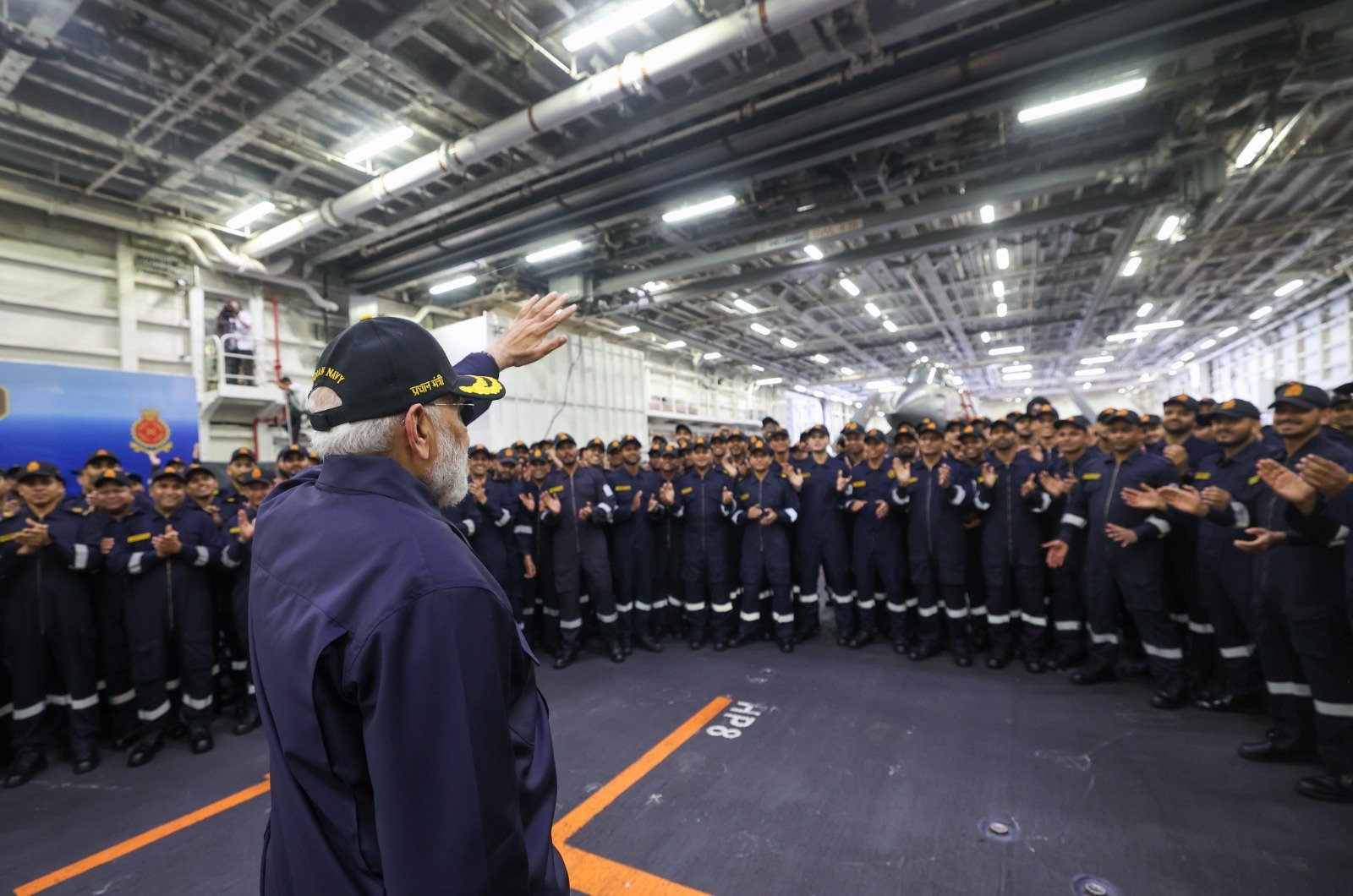India’s Maritime Message: PM Modi Uses Diwali to Underscore Naval Doctrine, Anchors India’s Defence Shift at Sea
In a symbolic assertion of India’s maritime rise and military self-reliance, Prime Minister Narendra Modi celebrated Diwali this year aboard the Indian Navy’s flagship aircraft carrier, INS Vikrant, off the western seaboard near Goa and Karwar.
Addressing sailors on the indigenous vessel, Modi described the experience as a deeply personal one, framing the Navy not only as a strategic arm of national defence but also as an embodiment of modern Indian resolve.
 |
| Prime Minister Narendra Modi aboard INS Vikrant with Indian Navy personnel during Diwali. Image: PM NaMo |
“This is my family,” Modi said, referring to the personnel onboard, “and I have come home for Diwali.” His remarks blended patriotic fervour with policy clarity, anchoring India’s naval capability to its larger strategic shift -- from regional balancing to active global maritime engagement.
Witnessed an awe-inspiring Air Power Demo on INS Vikrant, showcasing precision and prowess.
— Narendra Modi (@narendramodi) October 20, 2025
The take-off and landing of MiG-29 fighters on a short runway, both in daylight and in the dark night, was a breathtaking display of skill, discipline and technological excellence. pic.twitter.com/V0wwaOeYGH
The Prime Minister’s visit was steeped in symbolism. INS Vikrant, commissioned in 2022, is the first aircraft carrier built entirely in India, representing a cornerstone of the country’s ‘Aatmanirbhar Bharat’ (Self-Reliant India) initiative.
Modi referred to the ship as “not just a warship but proof of India’s resolve, resilience, and technological capability.” Since 2014, India has delivered over 40 domestically built warships and submarines to its navy.
Modi claimed that India now adds a new warship or submarine approximately every 40 days -- a statement reflecting both industrial scale and national ambition.
People love celebrating Diwali with their families. And so do I, which is why every year I meet our army and security personnel who keep our nation safe. Happy to be among our brave naval personnel on the western seaboard off Goa and Karwar on Indian Naval Ships with INS Vikrant… pic.twitter.com/Pb41kQnMMR
— Narendra Modi (@narendramodi) October 20, 2025
India’s defence production has more than tripled in the past decade, reaching over ₹1.5 lakh crore (approx. USD $18 billion) by 2024. In his address, Modi noted that this rise in indigenous capacity is shifting India from an importer to a credible arms exporter. “Our goal,” he said, “is to join the world’s top defence exporters.”
India’s BrahMos and Akash missile systems, among others, have sparked interest globally, as regional partners increasingly look to India for high-precision, reliable military hardware.
At the majestic flightdeck of INS Vikrant, with the MiG-29 fighters. pic.twitter.com/SRjeSpP4sg
— Narendra Modi (@narendramodi) October 20, 2025
The address also referenced recent operations, notably Operation Sindoor, where coordinated action by India’s three armed forces reportedly forced Pakistani positions to retreat -- though official details remain classified.
“The synergy between our forces has made even our enemies reconsider,” Modi said. “INS Vikrant did not just sail; it unsettled adversaries before firing a single shot.”
His Diwali speech wove together personal sentiment, strategic commentary, and domestic transformation. Modi referenced the near-eradication of Maoist violence in India, noting a drop from over 125 affected districts in 2014 to just three today.
He attributed this to the sustained effort of security forces across the spectrum -- including police units often excluded from frontline recognition.
"From CRPF to BSF, from ITBP to intelligence agencies -- each plays a role in securing the nation’s fabric," he said, noting that many of these forces continue to work without headline attention, despite bearing significant operational burdens.
Internationally, Modi positioned the Indian Navy as a stabilising force in a volatile Indo-Pacific. With 66% of global oil supplies and 50% of container shipping passing through the Indian Ocean, Modi emphasised that India is not merely a regional actor but a “guardian of the global commons.”
The Navy’s mission-based deployments, anti-piracy patrols, and humanitarian assistance in crises -- from tsunami relief in Indonesia to water supply operations in the Maldives -- were highlighted as examples of India’s expanding security footprint.
Highlights from INS Vikrant, including the Air Power Demo, a vibrant cultural programme and more… pic.twitter.com/Br943m0oCC
— Narendra Modi (@narendramodi) October 20, 2025
India is also working to deepen its partnerships with nations across the Global South through its evolving Maritime Vision 2030, focusing on shared infrastructure, emergency response, and defence collaboration.
Modi reiterated India’s commitment to being a “security partner of choice” from the African coastline to Southeast Asia -- a counterweight to expanding Chinese presence in the region.
The Prime Minister closed with a message of civil-military unity and national renewal, urging Indians to view the Navy’s rise not just as a defence milestone, but as a symbol of India's broader ascent. “From the ocean’s waves to the peaks of our borders, every soldier, every sailor, every citizen -- they reflect the same fire, the same will,” he said.
“This Diwali, the lamps are not just on the land, but on the water, lit by the valour of those who keep us safe.”
